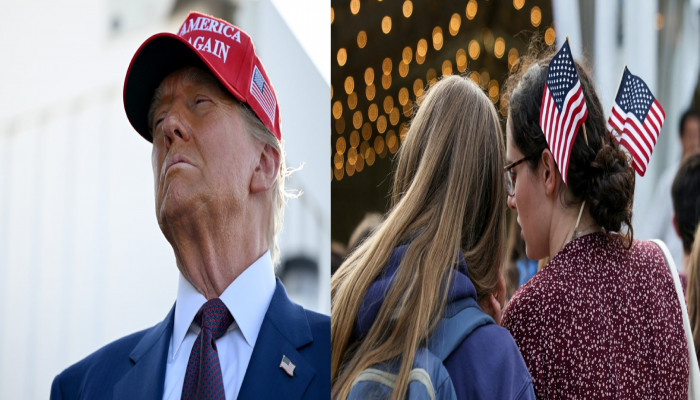US government revokes legal status of international students under new policy
- In Reports
- 12:41 PM, Apr 30, 2025
- Myind Staff
The US government has started revealing more information about its crackdown on international students, explaining how it targeted thousands of individuals and outlining the reasons for cancelling their legal status.
These new details came to light through lawsuits filed by some of the students who had their status revoked recently, often with little or no explanation. Recently, foreign students in the U.S. were shocked to find that their records were removed from a database managed by Immigration and Customs Enforcement (ICE). This caused some students to go into hiding for fear of being detained by immigration authorities, while others chose to abandon their studies and return home. However, after facing multiple court challenges, federal officials announced on Friday that they would restore the legal status of international students while they worked on creating a clearer set of rules for future terminations. On Monday, the government shared the new policy, which includes a document outlining various reasons a student's legal status can be cancelled, including the revocation of the visas they used to enter the U.S.
Brad Banias, an immigration lawyer representing a student whose status was cancelled, said the new guidelines give ICE much more power than before. Under the previous policy, visa revocation was not a reason for losing legal status. This gave authorities the power to have the State Department cancel a visa and deport students, even if they had done nothing wrong, according to Banias. Many students who had their visas revoked or lost their legal status mentioned that they only had minor issues on their records, such as driving violations. Some students weren’t even sure why they were targeted in the first place.
During a hearing on Tuesday, lawyers for the government explained the situation in the case of Akshar Patel, an international student studying information systems in Texas. Patel’s status was cancelled and then reinstated earlier this month, and he is asking the court for a ruling to prevent his deportation.
According to court filings and statements during the hearing, officials from the Department of Homeland Security explained that they had checked the names of student visa holders against the National Crime Information Centre (NCIC), a database managed by the FBI that contains information on crimes. This database includes details about suspects, missing persons and people who have been arrested, even if they were never charged with a crime or if charges were dropped.
About 6,400 students were flagged during this search, US District Judge Ana Reyes said in the hearing. Patel was one of them. He had been pulled over and charged with reckless driving in 2018, but the charge was eventually dropped, and this information was also listed in the NCIC. A spreadsheet containing the names of 734 students, which appeared in the NCIC (National Crime Information Centre) database, was sent to a Homeland Security official. Within 24 hours, the official responded, instructing to "terminate all in SEVIS," which is another database listing foreign students with legal status in the U.S.
Reyes pointed out that the quick response indicated that no one had taken the time to individually review the students' records to understand why their names were flagged in NCIC. She explained that this situation could have been avoided if someone had simply paused and carefully considered the issue. Reyes, appointed by former President Joe Biden, criticised the government for showing a complete lack of concern for individuals who have legally entered the country. When colleges discovered that students no longer had legal status, it caused confusion and chaos.
In the past, colleges would inform the government when students stopped studying at the school, which would then update their legal status. In some cases, colleges told students to stop working or attending classes, warning them that they could face deportation. However, government lawyers explained that the change in the database did not mean the students lost their legal status, even though some were marked as failing to maintain their status. They clarified that this was just an alert for further investigation.
Andre Watson from the Department of Homeland Security confirmed that Mr. Patel is legally present in the US and is not at risk of being detained or deported immediately. Judge Reyes decided not to issue a preliminary injunction and encouraged both sides’ lawyers to work out a settlement to allow Patel to stay in the US.







Comments